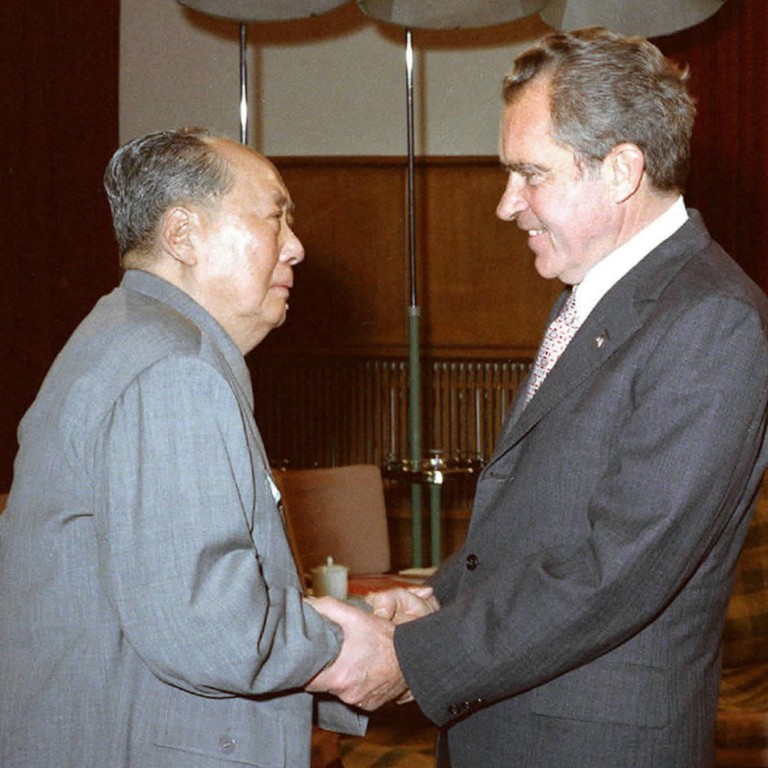
Lesson in courage of Mao-Nixon detente ignored with Putin’s war choice in Ukraine
- The 50th anniversary of the Shanghai Communique, signed on the last day of Richard Nixon’s visit to China, is a reminder of courage
- Can Beijing take its place as a world leader and help put a stop to the invasion, despite its recent pivot to Moscow?
The communique was a landmark document of detente in which Beijing and Washington agreed for the first time to jointly oppose the hegemony of the Soviet Union, while agreeing to disagree on most other issues – including Taiwan.
At the time, still mired in costly wars in Vietnam and Cambodia, the US was perilously close to nuclear war with the Soviet Union – which was threatening a largely isolated China with nuclear attacks, as the former communist allies took opposite sides of the India-Pakistan war.
All that changed with Nixon’s China visit, a stroke of genius that brought Beijing in from the cold to counter Moscow, eased tensions with the two largest communist countries, secured peace in the Asia-Pacific region, and eventually tilted the balance of the Cold War towards Washington.
It was a brave decision, on both sides, paving the way for the normalisation of ties which made possible China’s opening to the outside world, and its global ascendance – making it probably Beijing’s most consequential diplomatic agreement.
Like other historical documents, the relevance of the communique has faded, as China-US ties have shifted from estrangement to engagement and now drift towards decoupling.
How landmark Shanghai Communique shaped China-US ties for past 50 years
Despite its grievances and distrust of Washington, Beijing showed particular enthusiasm for the document’s anniversary, because in effect it recognised the legitimacy of communist rule over “all of China”.
Kissinger’s “acknowledge/do not challenge” formula on Taiwan, while ambiguous and imperfect, represented a breakthrough for Beijing – one which many China critics are now challenging.
The story of then US national security adviser Henry Kissinger’s secret preparations with former Chinese premier Zhou Enlai for Nixon’s visit is well known. What has been largely forgotten is the months and struggle it took to finalise the communique’s drafting.
The Beijing leadership, including chairman Mao Zedong, was initially extremely suspicious of Washington’s overtures.
Winston Lord, in the room with Mao and Nixon, on US-China relations then and now
During Kissinger’s secret Beijing visit in July 1971, Zhou asked him whether “given the vast differences in their views, was there really any point in a presidential visit?”
As American historian Margaret MacMillan put it, “Two men [Nixon and Mao] who, for all their faults, possessed the necessary vision and determination, and two men [Kissinger and Zhou] who had the talent, the patience, and the skill to make the vision reality.”
With Putin choosing war over peace in Europe, the world needs this kind of leadership and vision more than ever.
Beijing, caught in an unexpectedly awkward position, may also have some tough decisions to make. At some point, Chinese leaders must decide if it is in Beijing’s interests to distance itself further from Russia and its alleged war crimes.
Beijing’s pivot to Moscow – its “enemy’s enemy” – was driven by a shared interest in countering Washington and its allies, but the invasion of Ukraine calls for a recalibration.
China should not be hijacked by the Kremlin’s reckless resort to military force, nor President Xi Jinping’s joint commitment with Putin in Beijing last month to a “no limits” partnership.
To truly emerge as a global power, China will have to step outside its comfort zone and play a bigger role internationally. In this case, it could help the rest of the world stop Putin from wreaking havoc in Ukraine and beyond.
There may even be an opportunity, however remote, for Beijing to mend its ties with Washington as part of a rebalancing between the US and Russia.
The leadership in Beijing would need great courage and a long view – just like Mao and Zhou 50 years ago – to change course for a potential new era for China and the world.

